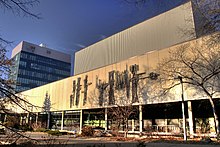|
University of Alberta Students' Union
  The University of Alberta Students' Union (UASU) is the student society that represents undergraduate students at the University of Alberta. Originally established in October 1908 as the Students' Council, the UASU is a non-profit corporation that operates under the authority of the Post-Secondary Learning Act (Alberta).[1] Its membership consists of the roughly 31,000[2] undergraduate students enrolled at the university. With an annual budget of more than $13,000,000 and hundreds of paid and volunteer staff,[3] the Students' Union serves as an advocate for students and provides a variety of services to its members. The Students' Union also operates a number of businesses, manages various targeted trust funds, hosts a wide variety of entertainment and educational events, and runs the Students' Union Building. HistoryThe UASU was founded in 1908 following the opening of the University of Alberta. Despite the university having a small student body of only 45 students, the original UASU consisted of eight elected representatives. Among the first body were Stacey McCall, the first UASU president, Cecil Rutherford, son of Alberta Premier and founder of the University of Alberta Alexander Cameron Rutherford, and Kathleen Wilson, the first woman to register at the University of Alberta.[4] In 1916, Katie McCrimmon was elected as President of the UASU. She became the first woman to become President of a students' union in Canada.[1] In 1920, the Students' Council was renamed to the University of Alberta Students Union. In 1927, the UASU undertook its first construction project. Resulting from the lack of sports and recreation facilities, the UASU imposed a $3 annual fee per student, raised $1800 from local businesses, and secured a $20,000 from the Alberta government for the purposes of building a covered skating rink. The rink was completed in December 1927 and remained in use for the next thirty years.[5] In 1951, the first building constructed by UASU opened. Presently called University Hall, it purpose was to house the UASU, but, was quickly found to be too small. University Hall was given to the University of Alberta's administration following the completion of the Students' Union Building in 1967.[6] In 1962 referendum, the student body approved an $11/term fee per student for the purposes of building a new student owned facility. In 1965, with funding from the Government of Alberta, construction began. The building, called the Students' Union Building (SUB), opened in 1967 and was the largest building of its kind in Canada upon completion.[7] In 1971, in response to a lack of affordable student housing, the UASU began construction on the Housing Union Building (HUB). It was completed two years later in 1973 and offered subsidized housing to students. Financial difficulties including a deficit of $1.8 million, forced the UASU to sell HUB to the University of Alberta April 1976 for $1.[8] In 2018, the UASU celebrated its 100th anniversary. Students' CouncilThe Students' Council is the highest decision-making body of the UASU and is composed of a speaker, a general manager (both of whom are non-voting members), councillors elected from each faculty, 5 executive members and an undergraduate student representative to serve on the university's Board of Governors, all of whom are elected in an annual campus-wide general election every March.[9] The breakdown of faculty councillors is as below:
RepresentationProvincially, the Students' Union participates in the Council of Alberta University Students. The Students' Union was a founding member of the Canadian Alliance of Students Associations. While it took a brief hiatus on its membership, having pulled out in 2003, the Students' Union moved to rejoin CASA in March 2008. In the fall of 2016, the Students' Union expanded the U-Pass program to Fort Saskatchewan, Leduc and Spruce Grove.[10][11] ServicesThe Students' Union provides a number of services to assist students in their academic careers. These services include:
The Students' Union also runs several businesses, which offer discounts to Students' Union staff and volunteers. Students' Union BuildingBuilt in 1967, the Students' Union Building (SUB) is the headquarters of the Students' Union. It contains the Horowitz Theatre. Myer Horowitz TheatreThe Myer Horowitz Theatre is a 720-seat concert hall used a venue for a variety of music, dance and lectures.[12] The theatre hosts no regular season, and is rented by various student and community groups. They also regularly host shows organized by local promoters looking for a smaller intimate venue in Edmonton. Built in 1967 during the building of the Students' Union Building, the theatre was originally called SUB Theatre. The theatre has been through two renovations since opening, a major overall in 1983 and a technical update in 1988. The theatre was renamed in 1989 to honour the outgoing university president at the time, Dr. Myer Horowitz.[13] Notable past presidentsSeveral people who have served as president of the University of Alberta Students' Union have gone on to achieve some level of fame.
See also
References
External linksWikimedia Commons has media related to University of Alberta Students' Union. |